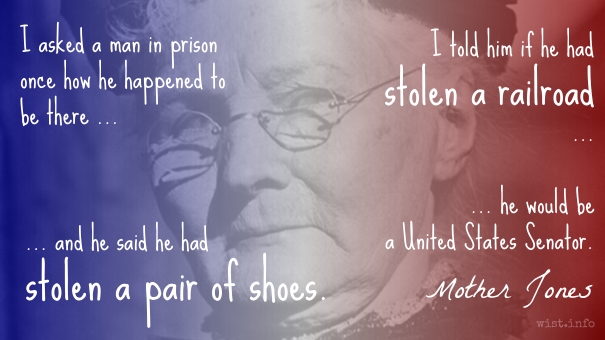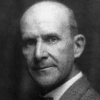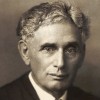The time is passed when you could have a happy minority living upon the misery of the great mass. That time is passed. People won’t acquiesce in it, and you will have to learn to put up with the knowledge that your neighbor is also happy, if you want to be happy yourself. I think, if people are wisely educated, they will have a more expansive nature and will find no difficulty in allowing the happiness of others as a necessary condition of their own.
Bertrand Russell (1872-1970) English mathematician and philosopher
Interview by Woodrow Wyatt, BBC TV (1959)
Collected in Bertrand Russell's BBC Interviews (1959) [UK] and Bertrand Russell Speaks His Mind (1960) [US].
Quotations about:
oligarchy
Note not all quotations have been tagged, so Search may find additional quotes on this topic.
The great question for our time is, how to make sure that the continuing scientific revolution brings benefits to everybody rather than widening the gap between rich and poor. To lift up poor countries, and poor people in rich countries, from poverty, to give them a chance of a decent life, technology is not enough. Technology must be guided and driven by ethics if it is to do more than provide new toys for the rich.
Freeman Dyson (1923-2020) English-American theoretical physicist, mathematician, futurist
“Progress in Religion,” Templeton Prize acceptance speech, Washington National Cathedral (9 May 2000)
(Source)
In short, the contradiction in the old defense of class stratification is that it defends leisure for the leisure class, but not for the underclass. With reference to the underclass, leisure is said to destroy the incentive to work, leads to slothfulness and self-indulgence, and retards cognitive and moral development. When applied to the leisure class, the concept evokes an image of Plato and Aristotle, whose leisure was based on slave labor, creating the intellectual foundations of Western civilization; or patrician slave-owners like Washington and Jefferson laying the foundations of American civilization; or creative aristocrats like Count Leo Tolstoy or Bertrand, Earl Russell; or, even closer to home, of our own sons and daughters (or of ourselves, when we were young adults) being freed from the stultifying tasks of earning a living until well into our adult years so that we could study in expensive universities to gain specialized knowledge and skills.
James Gilligan (b. c. 1936) American psychiatrist and author
Preventing Violence, ch. 5 (2001)
(Source)
When citizens are relatively equal, politics has tended to be fairly democratic. When a few individuals hold enormous amounts of wealth, democracy suffers. The reason for this pattern is simple. Through campaign contributions, lobbying, influence over public discourse, and other means, wealth can be translated into political power. When wealth is highly concentrated — that is, when a few individuals have enormous amounts of money — political power tends to be highly concentrated, too. The wealthy few tend to rule. Average citizens lose political power. Democracy declines.
Benjamin I. Page (b. 1940) American political scientist, academic, researcher
Democracy in America?: What Has Gone Wrong and What We Can Do About It, Part 1, ch. 2 (2017) [with Martin Gilens]
(Source)
Most anarchists believe the coming change can only come through a revolution, because the possessing class will not allow a peaceful change to take place; still we are willing to work for peace at any price, except at the price of liberty.
Lucy Parsons (1851-1942) American labor organizer, anarchist, orator [a.k.a. Lucy Gonzalez]
“The Principles of Anarchism,” lecture (1905)
(Source)
Why weren’t these problems obvious to the Maya kings, who could surely see their forests vanishing and their hills becoming eroded? Part of the reason was that the kings were able to insulate themselves from problems afflicting the rest of society. By extracting wealth from commoners, they could remain well fed while everyone else was slowly starving. What’s more, the kings were occupied with their own power struggles. They had to concentrate on fighting one another and keeping up their images through ostentatious displays of wealth. By insulating themselves in the short run from the problems of society, the elite merely bought themselves the privilege of being among the last to starve.
Jared Diamond (b. 1937) American geographer, historian, ornithologist, author
“The Ends of the World as We Know Them,” New York Times (1 Jan 2005)
(Source)
Allegiance to the group identity forged by political party affiliation renders Americans blind to the essential similarities between the agendas of the two parties, similarities that can be expected to be exactly the ones that run counter to public interest, in other words, those interests of the deep-pocketed backers of elections to which any politician must be subservient in order to raise the kind of money necessary to run for national office.
Jason Stanley (b. 1969) American philosopher, epistemologist, academic
How Propaganda Works, Introduction (2015)
(Source)
For the old notions of civil liberty and social order did not benefit the masses of the people. Wealth increased, without relieving their wants. The progress of knowledge left them in abject ignorance. Religion flourished, but failed to reach them. Society, whose laws were made by the upper class alone, announced that the best thing for the poor is not to be born, and the next best, to die in childhood, and suffered them to live in misery and crime and pain. As surely as the long reign of the rich has been employed in promoting the accumulation of wealth, the advent of the poor to power will be followed by schemes for diffusing it. Seeing how little was done by the wisdom of former times for education and public health, for insurance, association, and savings, for the protection of labour against the law of self-interest, and how much has been accomplished in this generation, there is reason in the fixed belief that a great change was needed, and that democracy has not striven in vain.
John Dalberg, Lord Acton (1834-1902) British historian
“Review of Sir Erskine May’s Democracy in Europe,” The Quarterly Review (Jan 1878)
(Source)
Once more, let me remind you what fascism is. It need not wear a brown shirt, or a green shirt — it may even wear a dress shirt. Fascism begins the moment a ruling class, fearing the people may use their political democracy to gain economic democracy, begins to destroy political democracy in order to retain its power of exploitation and special privilege.
Where some possess much, and the others nothing, there may arise an extreme democracy, or a pure oligarchy; or a tyranny may grow out of either extreme.
Aristotle (384-322 BC) Greek philosopher
Politics [Πολιτικά], Book 4, ch. 11 / 1296a.1-3 [tr. Jowett (1885)]
(Source)
Alternate translations:
- "When some possess too much, and others nothing at all, the government must either be in the hands of the meanest rabble or else a pure oligarchy; or, from the excesses of both, a tyranny." [tr. Ellis (1912)]
- "Where some own a very great deal of property and others none there comes about either an extreme democracy or an unmixed oligarchy, or a tyranny may result from both of the two extremes." [tr. Rackham (1932)]
- "Where some possess very many things and others nothing, either rule of the people in its extreme form must come into being, or unmixed oligarchy, or -- as a result of both of these excesses -- tyranny." [tr. Reeve (2007)]
- "Where some people are very wealthy and others have nothing, the result will be either extreme democracy or absolute oligarchy, or despotism will come from either of those excesses."
The methods by which the “Empire of Business” maintains its control over journalism are four: First, ownership of the papers; second, ownership of the owners; third, advertising subsidies; and fourth, direct bribery. By these methods there exists in America a control of news and of current comment more absolute than any monopoly in any other industry.
Upton Sinclair (1878-1968) American writer, journalist, activist, politician
The Brass Check, ch. 38 “Owning the Press” (1919)
(Source)
In reality, the likelihood of reaching the pinnacle of capitalist society today is only marginally better than were the chances of being accepted into the French nobility four centuries ago, though at least an aristocratic age was franker, and therefore kinder, about the odds. It did not relentlessly play up the possibilities open to all, … and so, in turn, did not cruelly equate an ordinary life with a failed one.
Alain de Botton (b. 1969) Swiss-British author
The Pleasures and Sorrows of Work, ch. 9 “Entrepreneurship” (2009)
(Source)
The surface of American society is, if I may use the expression, covered with a layer of democracy, from beneath which the old aristocratic colors sometimes peep.
Alexis de Tocqueville (1805-1859) French writer, diplomat, politician
Democracy in America, ch. 2 (1835) [tr. Reeve (1899)]
(Source)
Alt. trans.:
- As above, but given as "... sometimes seep."
- "American society, if I may put it this way, is like a painting that is democratic on the surface but from time to time allows the old acistocratic colors to peep through." [tr. Goldhammer (2004)]
- "The surface of American society is covered with a layer of democratic paint, but from time to time one can see the old aristocratic colors breaking through."
It was crowded in the Curry Gardens on the corner of God Street and Blood Alley, but only with the cream of society — at least, with those people who are found floating on the top and who, therefore, it’s wisest to call the cream.
People say law, but they mean wealth.
It is not merely that the ownership of any substantial share in the national wealth is concentrated to-day in the hands of a few hundred thousand families, and that at the end of an age which began with an affirmation of the rights of property, proprietary rights are, in fact, far from being widely distributed. Nor is it merely that what makes property insecure to-day is not the arbitrary taxation of unconstitutional monarchies or the privileges of an idle noblesse, but the insatiable expansion and aggregation of property itself, which menaces with absorption all property less than the greatest, the small master, the little shopkeeper, the country bank, and has turned the mass of mankind into a proletariat working under the agents and for the profit of those who own.
I asked a man in prison once how he happened to be there and he said he had stolen a pair of shoes. I told him if he had stolen a railroad he would be a United States Senator.
I’m not really rich. I’m something far more noble I’m a job creator. [Heavenly chorus] Sort of the same way Patagonian tooth-fish became Chilean sea-bass. [Heavenly chorus] But y’know what, just by suggesting, just by bringing it up, that he is going to tax me more, Comrade Obama has created an atmosphere of uncertainty that makes me skittish about creating more jobs, yeah, I have been so freaked out that today at breakfast I could barely butter my gold. You see, you poor people, you don’t get how much “uncertainty” gives us job creators the willies. It’s terrifying — like when you find out your private island has natives; or when your wife notices the maid’s kid looks just like you; or when the limo driver tries to start a conversation. So tax me at a higher rate if you like, you’re practically firing yourselves. Because I’ll tell you something, I have been so shitting in my pants about this uncertainty thing, that yesterday I let go a dozen essential workers at my compound, including my Tivo programmer, my manscaper, the liposuctionist, my gardener’s personal trainer, my dog whisperer, the lookalike I hired to foil assassination attempts, my private farmer, the lady who dispenses hand sanitizer after our pre-show prayer circle, the girl I pay to mistake me for Jon Hamm, and the guy who takes care of the shark tank. Which reminds me, I’m gonna have to let go two sharks!
It is a basic economic proposition that as long as a relatively few men own the railroads, the telegraph, the telephone, own the oil fields and the gas fields and the steel mills and the sugar refineries and the leather tanneries — own, in short, the sources and means of life — they will corrupt our politics, they will enslave the working class, they will impoverish and debase society, they will do all things that are needful to perpetuate their power as the economic masters and the political rulers of the people.
Eugene V. Debs (1855-1926) American union leader, activist, socialist, politician
“The Issue,” Speech, Girard, Kansas (23 May 1908)
(Source)
If I had to choose, I should detest the tyranny of one man less than that of many. A despot always has his good moments; an assembly of despots never.
Voltaire (1694-1778) French writer [pseud. of Francois-Marie Arouet]
Philosophical Dictionary, “Tyranny” (1764) [tr. Gay (1962)]
(Source)
We must make our choice. We may have democracy, or we may have wealth concentrated in the hands of a few, but we can’t have both.
Louis Brandeis (1856-1941) American lawyer, activist, Supreme Court Justice (1916-39)
(Attributed)
(Source)
Quoted by Raymond Lonergan in Irving Dilliard, Mr. Justice Brandeis, Great American (1941).
To blame the poor for subsisting on welfare has no justice unless we are also willing to judge every rich member of society by how productive he or she is. Taken individual by individual, it is likely that there’s more idleness and abuse of government favors among the economically privileged than among the ranks of the disadvantaged.
I hope we shall take warning from [England’s] example and crush in its birth the aristocracy of our monied corporations which dare already to challenge our government to a trial of strength and bid defiance to the laws of our country.
Thomas Jefferson (1743-1826) American political philosopher, polymath, statesman, US President (1801-09)
Letter to George Logan (12 Nov 1816)
(Source)
Everything is un-American that tends either to government by a plutocracy, or government by a mob. To divide along the lines of section or caste or creed is un-American. All privilege based on wealth, and all enmity to honest men merely because they are wealthy, are un-American — both of them equally so. Americanism means the virtues of courage, honor, justice, truth, sincerity, and hardihood — the virtues that made America. The things that will destroy America are prosperity-at-any-price, peace-at-any-price, safety-first instead of duty-first, the love of soft living, and the get-rich-quick theory of life.
There is something wrong in a government where they who do the most have the least. There is something wrong when honesty wears a rag, and rascality a robe; when the loving, the tender, eat a crust, while the infamous sit at banquets.
Of all tyrannies a tyranny sincerely exercised for the good of its victims may be the most oppressive. It may be better to live under robber barons than under omnipotent moral busybodies, The robber baron’s cruelty may sometimes sleep, his cupidity may at some point be satiated; but those who torment us for own good will torment us without end, for they do so with the approval of their own conscience. They may be more likely to go to Heaven yet at the same time likelier to make a Hell of earth.




























